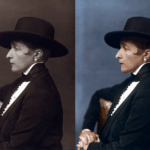On November 9, 1928, pioneering LGBT author Radclyffe Hall was put on trial for “obscenity” for her lesbian novel The Well of Loneliness. Hall’s contemporaries, including such literary legends as Virginia Woolf, George Bernard Shaw, T. S. Eliot , and E. M. Forster, were outraged. Woolf and Forster even wrote a letter, printed in the prominent UK political newspaper The Nation and the Athenaeum, bemoaning the gruesome effects of censorship on literature. (Months later, Woolf herself would confront and cleverly subverted the issue with the novel Orlando.) Still, a week after the beginning of the trial, Chief Magistrate Sir Chartes Biron issued his verdict: The book was to be burned, and the defendants to pay the court costs.
The case endures as the token tragedy of LGBT suppression in literature and a gruesome epitome of censorship at its most oppressively moralistic.
Photo color restoration by Mary Siaw.

Leave a Reply